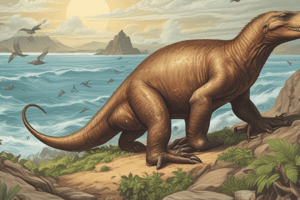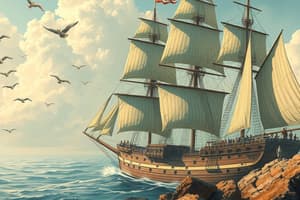Podcast
Questions and Answers
What was Charles Darwin's primary mission on his journey aboard the HMS Beagle?
What was Charles Darwin's primary mission on his journey aboard the HMS Beagle?
to collect and record the geological and biological diversity he saw during the voyage
Darwin believed that species do change over time during his early journey.
Darwin believed that species do change over time during his early journey.
False (B)
What process did Darwin propose for how species arise and change?
What process did Darwin propose for how species arise and change?
- Natural selection (correct)
- Survival of the fittest
- Artificial selection
- Genetic drift
What is the principle that Darwin's theory of evolution by natural selection explains?
What is the principle that Darwin's theory of evolution by natural selection explains?
Who developed the binomial system of nomenclature?
Who developed the binomial system of nomenclature?
Carolus Linnaeus believed that each species had a fixed 'ideal' form.
Carolus Linnaeus believed that each species had a fixed 'ideal' form.
What did Georges-Louis Leclerc (Count Buffon) contribute to the concept of evolution?
What did Georges-Louis Leclerc (Count Buffon) contribute to the concept of evolution?
Fossils are the remains of ______ from the past.
Fossils are the remains of ______ from the past.
Which of the following scientists is known for comparative anatomy?
Which of the following scientists is known for comparative anatomy?
By the late eighteenth century, scientists had discovered fossils.
By the late eighteenth century, scientists had discovered fossils.
What is taxonomy?
What is taxonomy?
Flashcards are hidden until you start studying
Study Notes
Charles Darwin and the HMS Beagle
- In December 1831, Charles Darwin embarked on a five-year voyage aboard the HMS Beagle, serving as the ship's naturalist.
- His primary mission was to document geological and biological diversity encountered during the journey.
- Initially a proponent of species immutability, Darwin's observations during the voyage led him to question this view.
Development of Evolutionary Theory
- Darwin proposed evolution as a process of genetic change over time, resulting in variation within species.
- He emphasized that this change is driven by natural forces rather than supernatural influences.
- Despite initial resistance from contemporaries, Darwin's ideas gained acceptance following the scientific revolution of the late 1800s.
Legacy of Darwin's Theory
- 150 years after its introduction, Darwin's theory of natural selection is now a fundamental concept in biology.
- It explains the unity and diversity of life, common ancestry of organisms, and adaptation to various environments.
Mid-Eighteenth-Century Philosophical Influences
- Plato believed every species has a perfect "essential" form, viewing variations as imperfections.
- Aristotle classified organisms by their complexity, establishing a hierarchy of life.
- Count Buffon contributed to natural history with a 44-volume work, presenting evidence for evolution influenced by environmental factors and the struggle for existence, though he often fluctuated between evolutionary ideas and the notion of fixed species.
Taxonomy and Classification
- Carolus Linnaeus developed the binomial nomenclature system, assigning two-part names to species (e.g., Homo sapiens).
- He adhered to the fixity of species and introduced the concept of scala naturae, a hierarchy where simpler beings occupy lower rungs.
Comparative Anatomy and Fossils
- Comparative anatomy was utilized to identify similarities among species and classify organisms.
- By the late 18th century, scientists recognized fossils as remnants of ancient plants and animals, leading to comparisons with living species.
- Initially, each fossil was thought to have a living descendant, but later findings complicated this assumption, revealing some fossils lacked modern counterparts.
Studying That Suits You
Use AI to generate personalized quizzes and flashcards to suit your learning preferences.



